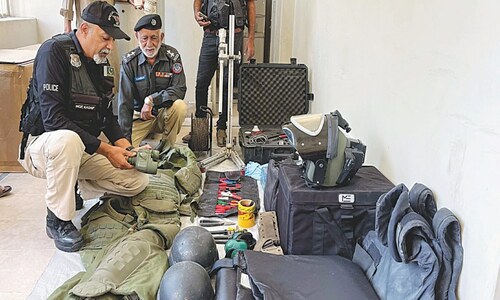KARACHI, Jan 26: A survey conducted by an ambulance service has found that over 80 per cent of the paediatric and 50pc of the adult emergencies being handled by the organisation are related to inter-facility transfers — shifting patients from one hospital to another.
The findings of the survey were shared at a seminar titled Paediatric emergency care in developing world: setting priorities, held at the Aga Khan University on Friday. The event was jointly organised by the AKU, ChildLife Foundation and Aman Foundation.
“The share of paediatric cases in our total emergencies had increased from 10 per cent (1964) to 14pc (16,795) in four years while the organisation handled more than 100,000 emergencies last year. More than 13pc of the total interventions of the ambulance service stand for children under 12 and of these cases, 11pc are inter-facility transfers,” said Ather Jamal, head of the emergency medicine services, Aman Health.
Giving some more statistics, he said of the total 39,631 paediatric cases handled from 2009 to 2012, over 33,000 were hospital-to-hospital transfer cases whereas over 23,000 cases were of infants. Of them, over 15,000 cases were inter-facility transfers.
“This is because many health settings declared as a ‘hospital’ do not have the required facilities to handle serious cases. Often the patient at such facilities is mishandled, too,” he said, adding that transfers often took place in critical and unstable conditions and within few hours after delivery.
Illness, traffic accidents, breathing problem, convulsions/fitting and traumatic injuries were found to be some other reasons for seeking the ambulance service, he said.
According to Mr Jamal, 400 ambulances were currently operational in the city and transferred about 4,000 patients daily. Ironically, however, only 20pc of them had intervention capability.
Patient transfers, according to Dr Junaid Razzak, head of the department of emergency medicine, AKU, were required not only from smaller hospitals but also, at times, from big government hospitals.
“It’s unfortunate that ambulance services, which should have been used to shift a patient from home, are being used to transfer a patient from one hospital to another,” he said while stressing the need for strengthening public sector hospitals and making training in emergency care a mandatory academic requirement at medical schools across the country.
Security, he pointed out, had emerged as the biggest challenge for doctors, especially for those working at emergency departments, and there was a dire need that the government attended to it.
Giving a presentation, Improving paediatric care in public sector, the Civil Hospital Karachi’s experience, Dr M. Irfan Habib said the survival rate at the CHK’s paediatric emergency room had increased from 20pc to 44pc from Jan-April to Sept-Dec last year following intervention through reconstruction of the facility and staff’s training in latest life-saving techniques and implementation of treatment protocols. This was done with the help of ChildLife Foundation, a non-governmental organisation.
“This was achieved by focusing on reasons causing high mortality and we came to know that often children were brought in shock. The staff was given relevant training and the survival rate for children increased from 20pc to 40pc,” he said.














































Dear visitor, the comments section is undergoing an overhaul and will return soon.